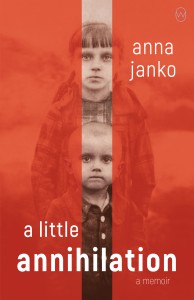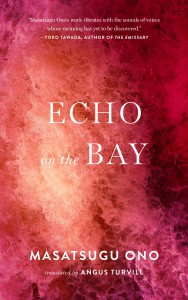This month, our selections of newly published literature from around the globe seem to cohere under the umbrella of trauma and memory, and the way they inevitably turn into narratives in the process of retrospection. From a Polish work of non-fiction that traces the sufferings of Poles during WWII, to the journals that document a Jewish immigrant in Brazil, to the strange and unspoken secrets of a small village in Japan—these works are of both documentation and imagination.

A Little Annihilation by Anna Janko, translated from the Polish by Philip Boehm, World Editions, 2020
Review by Katarzyna Bartoszyńska, Educational Arm Assistant
It is a grim fact, one that acquires increasing urgency in recent years, that those who were alive to experience the horrors of the Second World War are getting older: before long, we will no longer be able to talk to people who have direct experience of those times. Thus, we are increasingly grappling with the problem of second-generation memory: with the matter of how the descendants of survivors preserve and pass on the stories of the past for future generations, and with questions as to whether, or how, those descendants inherit the trauma of their ancestors. Anna Janko’s A Little Annihilation is a powerful meditation on these issues.
In this reckoning with the past, Janko describes the destruction of the Polish village of Sochy by the German military on Tuesday, June 1, 1943: the inhabitants massacred and buildings burned to the ground over the course of a mere few hours. Nine-year-old Teresa Ferenc, Janko’s mother, was among the survivors. In recounts of conversations, her mother describes her memories of that day—most especially, witnessing the death of both of her parents. Janko also chronicles interviews with other survivors from the village, interweaving their stories and noting the discrepancies between them, while describing efforts to tabulate the exact number of lives lost. The impossibility of establishing precise details is a crucial reminder of the intertwined nature of history and memory, a refutation of the common notion of their opposition, as well as a reflection on the challenges of documenting a massacre.
For some English-language readers, Janko’s text may be the first work they have encountered that discusses the sufferings of non-Jewish Poles during the Second World War. For Americans especially, to learn about Nazi atrocities is generally to learn about their efforts to exterminate European Jews, without a detailed understanding of how their eugenicist ideology shaped their policies and strategies in a broader variety of ways. Confusion over the fact that Poland was occupied territory has led to mistaken statements about “Polish death camps” (most notably, perhaps, when President Barack Obama used the term during a ceremony awarding the Presidential Medal of Freedom to Jan Karski in 2012; he later apologized for the error)—as Janko angrily reminds readers. “In my opinion it would be best if Germany gathered up all the camps they left behind in Poland. So that no one would be mistaken any longer.”
Though the centerpiece of her text is the experience of non-Jewish Polish peasants, Janko is careful to repeatedly acknowledge that Jews were the main focus of the German campaign of extermination. She treads lightly around the question of Polish complicity in their murder—an issue that has become increasingly controversial in recent years, as Poland’s conservative government strives to enshrine an image of the past that denies any wrongdoing. Janko is more circumspect: “That’s right, people from the village claim that they helped [the Jews] as well.” She asks her mother about claims that peasants from the region were virulently anti-Semitic and participated in the killing of Jews, and records her mother’s vehement denial. This section of the text ends both with a reminder of the punishment that awaited Poles who were found to be harboring Jews (either immediate execution, or deportation to a camp, for the entire family), and an acknowledgment that anti-Semitism was “a pandemic disease,” before concluding with a pointed accusation that resonates in the present as well: “Of course, even when there could have been some possibility of escape, the doors in the West remained closed to refugees seeking asylum . . .”
To note these aspects of the text is to remember that the story of the past is always political, and often controversial. But what is most striking, perhaps, about Janko’s text is that she also reminds us that it is work. She does not only record the testimonies and visit the sites, but also strives to situate these accounts within a larger context, spinning out the various possible alternatives in their fates or studying popular representations and documentary films about the period, and drawing comparisons to other histories of mass murder—in Cambodia, Turkey, and the USSR, for instance. But this extensive research is conveyed in the same essayistic tone as the rest, without drifting into a weighty scholarly idiom.
The details are often horrific, and difficult to read, and this too, is intentional. Noting that many women her age avoid movies and books about the war, saying that they already know about it and can’t bear to see more, Janko explains that she used to share this view, but now she takes it as a duty to watch everything. “And if one particularly cruel detail causes my hair to stand on end, or my stomach to become a block of ice, I immediately control myself, because this is the work I have to do; it’s important for you, especially now that you’re starting to forget, and for my children, if someday they might ask me about these things.” In our present moment, as we are, it seems, constantly bombarded with videos, images, and stories of atrocity, Janko’s book is a bracing reminder that history must not be recorded in euphemisms. But her text also makes vividly clear the psychic costs of this labor, the continued burden of the past on the present, in the various descriptions of her childhood nightmares, and meditations on the complexities of her relationship with her mother.
Though deeply personal, Janko’s narrative is also a compelling work of philosophic reflection, a signal contribution to contemporary efforts to think about our relationship to the past.

On a Clear April Morning by Marcos Iolovitch, translated from the Portuguese by Merrie Blocker, Academic Studies Press, 2020
Review by Eva Wissting, Editor-at-Large
Marcos Iolovitch’s On a Clear April Morning is an autobiography—first published in Portuguese in 1940 with a second edition in 1987, and now introduced to English readers by Merrie Blocker. A series of short memories arranged in twenty-seven chapters of chronological order and without an overarching dramatic arc, the book becomes a chronicle rather than a novel—a chronicle of a specific time and a specific Jewish immigrant experience.
Nevertheless, these are often delicately described, and the book is beautifully translated as Blocker manages to transmit the Portuguese into an English that flows naturally even through paragraph-length sentences, successfully keeping the translation as close as possible to the original phrasing without losing the musicality of Iolovitch’s writing:
Situated on the left bank of the Schisterni River, on whose bed the village youth used to skate in winter when the waters transformed themselves into a thick and polished mass of ice, Zagradowka lay far from civilization, forgotten by the world, abandoned by the government and left to its own fate, as were innumerable small communities of the extinct Czarist Empire that found themselves dispersed across the immeasurable vastness of the steppes.
It was in the early twentieth century that Iolovitch arrived in Brazil from the Ukrainian village Zagradowka—at the time a part of Russia—together with his parents and siblings. With “On a clear April morning in the year 19 . . .”, Iolovitch starts with his earliest childhood memories of crossing waters through Europe and then onwards to Brazil. The following chapters document different episodes of the family’s struggles with poverty, starvation, discrimination, and alcoholism, as well as the narrator’s struggles with bullying—however, there are also friendships and loves that both develop and pass. While the initial chapters are told with a bit of a distance that can be expected with the blurring of childhood memories, the chapters toward the end—in which the narrator is more grown-up—become more vivid as he retells ideas and opinions that are important to him.
A recurring theme throughout the book is how the mark of poverty affects Iolovitch throughout his childhood and adolescence. He struggles to overcome hunger and the cold during a particularly rainy night in a rented shed, where it rains through the ceiling while the wind blows through the walls. The shame of poverty, though, is something that he never overcomes. In school, he prefers to stay hungry rather than letting the other students see what he eats, and later in life he makes the movements of eating a full meal just in case nosy neighbors are looking. In this way, Iolovitch reveals the complex burden of poverty that is not only about coping with its physical effects, but even worse, to carry the shame of it.
While it’s always interesting to hear a story directly from the narrator themselves, the great value of this book surfaces in its combination with the accompanying essay which is presented as the afterword by the translator. This essay provides an enlightening historical context, which helps the reader to read even further between the lines of Iolovitch’s narration. In this way, the essay completes the chronicled memories into an entity; for example, the afterword deepens the understanding of what might have convinced the Iolovitch family to move to a new country while leaving a seemingly stable life in the Ukraine, and how they thereby fit into a world history of colonization.
As a chronicle of its time, it’s hardly surprising that Iolovitch’s writing includes numerous descriptions and phrases that are more outdated than comfortable. Women only appear as caretakers and as the objects of a Petrarchan form of romanticized love. People of color, if at all visible, are described with dubious labels. Most striking, however, is the continuous concealing of the Indigenous peoples of the Americas by maintaining that Brazil is part of a land that is somehow “New” and not least available for the taking by anyone from Europe who so desires. That this is part of Iolovitch’s worldview during the first half of the twentieth century is of course natural—this is part of the global colonization project that he and his family are tiny bricks in. Why the publisher today chooses to re-emphasize this worldview in the forewords, and nowhere in any of the accompanying paratexts of the book contextualizes it, is more difficult to understand.

Echo on the Bay by Masatsugu Ono, translated from the Japanese by Angus Turvill, Two Lines Press, 2020
Review by Alyea Canada, Assistant Editor
Echo on the Bay is unstuck in time. I tell you this now because while this story is a tangled knot of secrets and shames, it doesn’t unravel into anything resembling a straight line. You will never reach an “a-ha” moment where everything comes together and becomes clear. Stories beginning in the first fifty pages aren’t concluded until the last twenty; narratives overlap, interrupt each other, and sidebars abound. It’s unsettling, but this timelessness is also a large part of what makes Masatsugu Ono’s novel so compelling.
From the beginning, Ono undercuts almost every expectation you may have for Echo on the Bay. Stories of small towns with dark secrets are fairly universal, but Ono’s matter-of-fact narrative style slowly starts to reveal something uncanny about this quiet fishing village. The book opens:
Dad had a lot of things bothering him when he was stationed on the coast.
There was the abandoned boat floating in the bay. There was the body that Mitsugu Azamui said was on the beach, but which nobody had ever found. There were the boys who kept shooting bottle rockets at old Toshiko-bā’s house. And then there was me, in love with Mr. Yoshida, my social studies teacher.
This serves both to immediately alert the readers to the main catalysts of conflict (with one red herring) and to nudge the reader off balance. When looking at that list of concerns, they are all given the same weight despite the fact that a disappearing dead body and an abandoned boat seem significantly more distressing than bottle rockets and a school crush. From there, the story jumps to the narrator’s father excitedly announcing his promotion to sole police officer of a small fishing village in the Oita Prefecture. The list of “bothers” from the second paragraph are forgotten for now as we are introduced to a colorful cast of locals who arrive to drink with the new officer.
For the first half of Echo on the Bay, Ono writes with a comedic tone. Miki, the teenage narrator, recounts overheard stories as drunken villagers let slip local secrets. At first, the villagers’ demands on Miki’s father are comedic. Corruption in a local election between two feuding businessmen turns into pressure for a mock arrest with each side offering two men to be “jailed” overnight, but even this half-gesture at accountability is botched when Miki’s dad spends the day playing pachinko with the arrestees. When a ghost ship returns to the bay, the story shifts—almost mid-page—from a quirky comedy about village life to a reckoning with a violent and xenophobic history that quickly implicates the whole town.
Miki’s matter-of-fact narration, skillfully rendered by translator Angus Turvill, works masterfully with the nonlinear plot to further keep the reader off balance. Stories are recounted casually and without judgement regardless of the content, and Ono deploys radical narrative shifts and interruptions to remind the reader that there is no reliable narrator here. When Miki recounts drunken conversations, often heard from another room, those conversations in turn are second- and third-hand stories—myths passed down through generations, and as the details grow more mythical it seems a natural evolution. Even the story’s final traumatic reveal—one Miki sees for herself—is quickly undercut: “I was relieved that the reality turned out to be what Toshi saw and not what I saw. But if what I saw wasn’t real, then what was that appalling smell?”
The uncertainty Miki experiences here is one that is familiar to the reader by now, but it also has a particular unintended resonance today. We are living in an age where information and stories can be and are quickly manipulated by governments, mass media organizations, and everyday individuals. As a global pandemic has left everyone living in a world that is both familiar and distorted and as Black people in the United States and abroad fight for their lives and experiences to matter, many have found themselves exhausted as their brains attempt to render the world into something recognizable. This same struggle, on a much smaller scale, is at work in Echo on the Bay. At its core, it is about a village struggling to reckon with—and absolve itself of—past evils.
There is no finding your footing in this novel; instead, the story constantly slips through your fingers like grains of sand. If at any point you think you have figured something out, it will quickly shift and morph again, but if you paid any attention to the title, you would have been expecting this. Echoes are a voiceless messages unstuck from time. They are ghosts of the past that degrade as time passes. Their fidelity and reliability fade. And sometimes they morph into something deeply unsettling. Echo on the Bay is an engrossing and, at times bizarre, novel, but its true power is that through all of the disorientation and dislocation, at the center of the story lie acutely familiar sins.
*****
Read more on the Asymptote blog:

